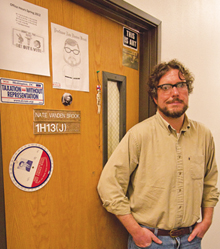Political science professor recalls his beginnings


Chris James/Pioneer
Professor of Political Science, Nathan Vanden Brook said his mother strongly influenced the development of his political efficacy. In fact, he said, the first protest Vanden Brook attended was with his mother and brother.
Peaceful protesters stood outside of the Ann Arbor, Mich., police station in opposition to a Ku Klux Klan rally being held in 1998. The Klan, protected by a chain link fence, shouted its borderline hate speech as anarchists decided to use the opportunity to turn the peaceful protest into a violent, window-smashing, rock-throwing riot in the hot May afternoon.
“I think I was 21 at the time,” OCCC Political Science professor Nate Vanden Brook said.
Now in his 30s and a political science professor, Vanden Brook was one of the peaceful protestors gathered that day in opposition to the Klan’s hateful message.
He said he is generally against violence and played no part in the anarchism, but Vanden Brook did have his Minolta camera at the ready when the riot broke out. He decided to do what most people would do in his situation, and started shooting some pictures.
Rioters were throwing rocks and breaking windows when the police began firing tear gas into the crowd. Vanden Brook framed a photo of a rioter throwing a tear gas canister back at officers. Just before he released the shutter, he heard a sinister thud and looked down to see a fresh canister coming to rest two to three feet in front of him.
When the canister detonated, it unleashed a face full of tear gas that rendered Vanden Brook unconscious.
“Hey man, are you okay?” a guy asked Vanden Brook after he had regained consciousness 10 to 15 minutes later.
This was not Vanden Brook’s first or last time protesting the Klan. He said he had attended three to four protests prior to the tear gas incident and has attended five more since.
Vanden Brook believes the Ku Klux Klan, like all citizens, “have a right to gather and speak, but when the message is repressive in nature we have a right and obligation to also speak out against it.”
Growing up, Vanden Brook recalls a household where political discussions between his parents were fairly common. His parents ensured that he and his brother knew the importance of voting and exercising your rights as a means of making your voice heard.
Raised Roman Catholic, Vanden Brook’s parents always tried to instill a strong sense of civic duty and social involvement in their children. He remembers that even his grandparents seemed to have strong feelings about social responsibility.
During the Vietnam War, Vanden Brook’s father let the draft exclusion afforded him as a machinist expire, because he felt he should be eligible to serve his country in its time of need. Being a skilled machinist actually saved him from a direct combat role, and he was able to serve his country and return home to his family afterwards.
Vanden Brook said his mother strongly influenced the development of his political efficacy. In fact, the first protest Vanden Brook attended was with his mother and brother.
They went to the Federal Building in Detroit to protest the first war in Iraq. His mother was using this as an opportunity to demonstrate public political speech as protected by the First Amendment to her two sons. She also made sure they understood this was only one of many ways to protest.
Driven to make a lasting, helpful impact on the world, Vanden Brook had a hard time trying to decide between becoming an attorney at law or a college professor. He eventually chose the classroom over the courtroom because as he said, “If I can reach two students a semester, it will have an exponential effect on the world.”
It was at Kalamazoo Valley Community College in Kalamazoo, Mich., that Vanden Brook became inspired by his first political science professor to one day teach college courses.
Through Professor Tom Oberlink’s example, Vanden Brook said he was able to see the power of a dedicated professor to educate and encourage young people to get engaged in the political world that defines our society.
Vanden Brook graduated from Western Michigan University with a master’s in political science, and taught as an adjunct professor at KVCC, Muskegon Community College and Western Michigan University.
Vanden Brook’s decision to uproot and move to Oklahoma came when he was offered what he called, “a fantastic job at an institution where the faculty meets student enthusiasm.”
At OCCC, Vanden Brook will teach American Federal Government through the summer and fall semesters, and Contemporary Issues in Political Science in the fall.
Aside from the job offer, he said, Oklahoma always had a place in his heart after that destruction exhibited by the bombing of the Oklahoma City Federal Building. He was 18 at the time. “[It] solidified my belief in open and honest debate and discussion.”
When asked for his thoughts on the current political climate, Vanden Brook describes it as a “toxic petri dish.” He says, “neither side [right or left] talks to one another and the lack of civil discourse is destroying the democratic process.”
Vanden Brook has yet to be involved in the Oklahoma political scene. He said he is still getting a feel for the political landscape here.
When asked what goals are still on the horizon, he paused for a moment, then said with smile, “Learn to ride a unicycle and get a Ph.D.”
To contact Chris James, email pioneerphotog@occc.edu.